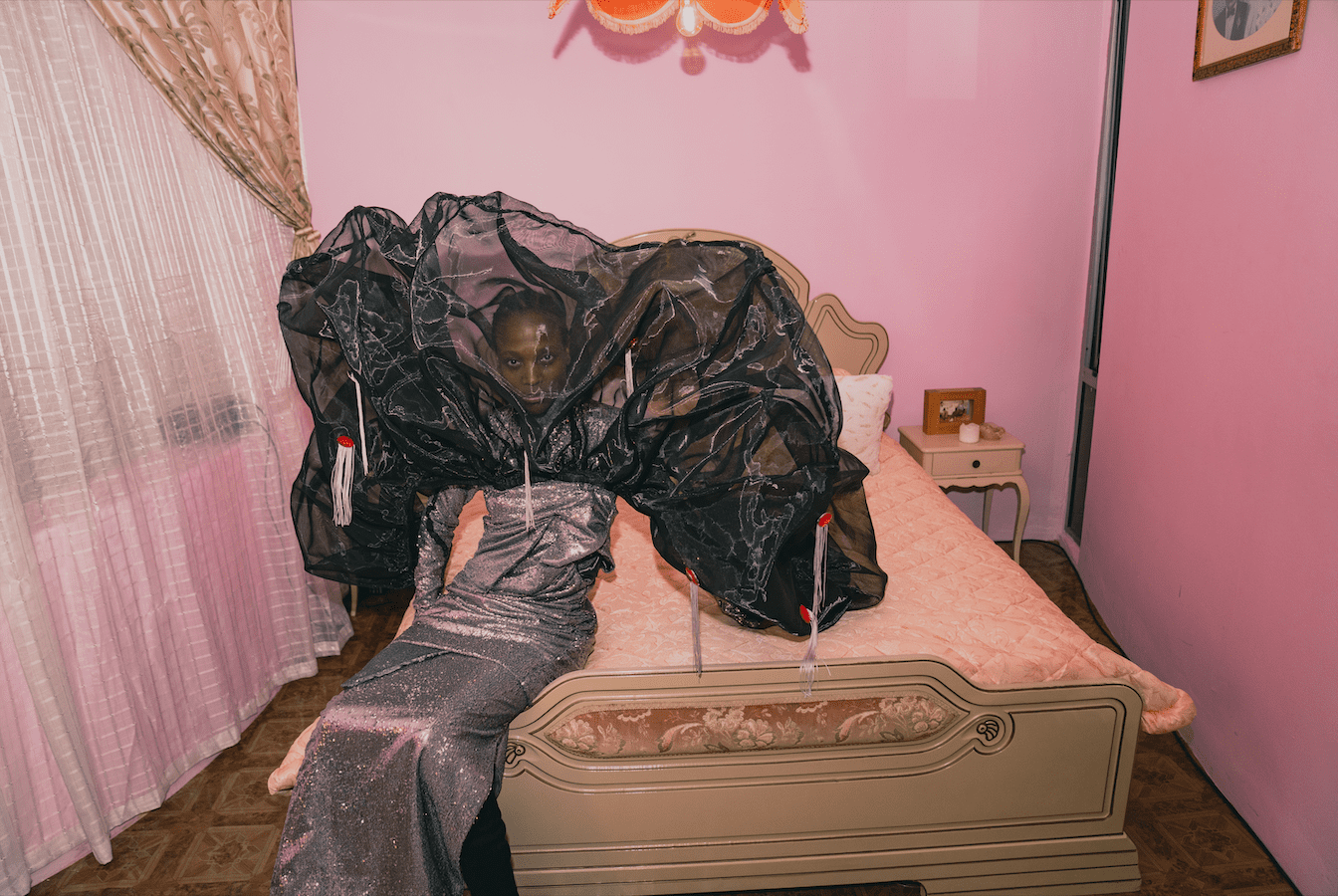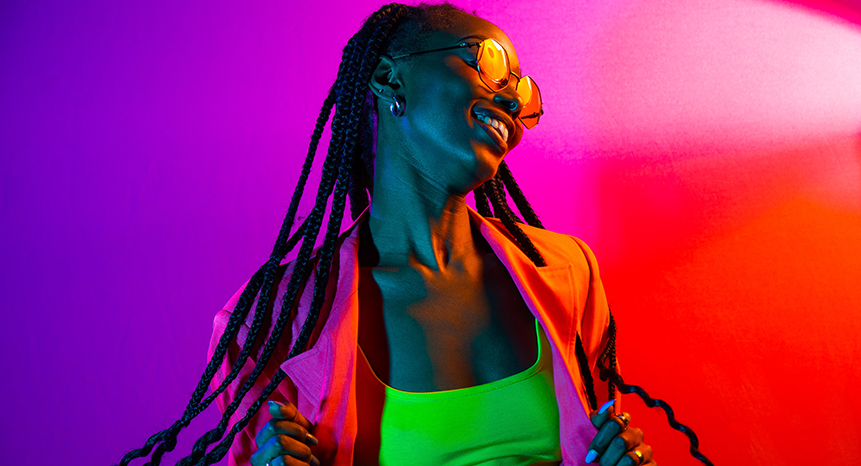Nike celebrated 40 years of the Air Force 1 with an exhibition and event that highlighted their heroes of community and purveyors of culture in Melville this past weekend. The featured protagonists were Wanda Lephoto, Anthony Bila, and Dbn Gogo.
Wanda Lephoto is a Johannesburg-based Fashion Designer and Curator with a keen eye and mind for turning the mundane into an analysis representative of African people in ways they may have never experienced before. His work may trigger a sense of release and healing upon viewing as he grants us the literal embodiment of our highest selves through his clothing.
Anthony Bila is a South African Artist that grills South African and African stories as the conduit and conductor through which they are consumed. He does this by using photography to capture and participate in the flipping of the narrative around representation.
We got to chat with Wanda and Anthony about their creative journeys and what evolution looks like as an artist.



Wanda Lephoto: Who were some of your greatest inspirations growing up?
The people of the city and the subcultures just as they began. Being there to witness it all and seeing dance and music culture was always exciting. The rise of Kwaito as a music genre and the dance and lifestyle element of amaPantsula was beautiful. And so, seeing Vintage Crew, CUSS Group and Tom London with Amabhujwa and Skhothane pioneers always informed the city’s spirit and what I loved.
These were some great inspirations for me.
Anthony Bila: How much does the culture influence your work?
That depends on what you consider to be culture. The concept has become a bit of a buzzword, and its context is forgotten or bastardised. Culture, as I understand it, encompasses core elementally, for instance, greater Community, knowledge & stories, language, traditions, rituals, techniques & skills, tools & objects, the arts, food & drink, and most importantly, values.
When you start to see culture as more than what is considered trendy, you begin to understand it as more than just what you see online, in magazines, or on tv. It is a way of life and a philosophy that informs every aspect of your authentic self. So, in that sense, we are all a part of the culture. I am influenced by it just as much as I exert my influence over it. It is not a one-dimensional binary. Culture is fluid.



Wanda Lephoto: Tell us more about your journey and the people who have come along with you?
I have had so many people be a part of my journey who have impacted me in many ways. My mom and dad played a huge role in my life in allowing me to pursue the dreams I had for myself when I began to understand what I wanted to achieve. My best friends and brothers, Darlington and Dalisu, changed my life and made me see a bigger picture of the world than the one I had with friends who believed in me even when I didn’t believe in myself.
The Sartists was great for me as a creative, having people to lean on and support my creative ambitions. The Global Village of The Brooklyn Circus, Street Etiquette, and Art Comes First was astounding for helping me think bigger. The design agencies I have worked and continue to work with have enabled me to form an opinion on campaigns and gave me a voice within the community to select other creatives to highlight. Brands and the people behind them that believed in me and sent PR products, seeding, and picked my brain…Everyone.
My friends and peers from Thebe to Rich, Lukhanyo, Celeste, MmusoMaxwell and other Fashion Designers have inspired me through their work. They keep me centered and grounded in the hopes that we can all create change in our unique ways.
I want to mention Chloe, Aart, Lebogang, Nkuley, Mordekhai, Tamara and Taylor, Queen Lohanda, Pona, Fakamatah, Lindiwe, Koa, Frank, Branden, and Lazy Luke. Their influence is lasting alongside Tracy, Gabriel, Hanro, Ketia, Don, Tshepang, Bobby, Suzy, Oratile and Kyanna, Lenzo, Annice, Shann, Jackson, Kabelo, Gambino, and Andile Buka. Lord, forgive me if I have left out any names as every individual who has contributed through photography, styling, modeling, makeup, or otherwise over the last few months post-covid to support me and help me in my journey.

The list of those who have joined me on my journey includes fashion buyers and stores that stock our merchandise. They continue to give us a fighting chance. All sponsorships we have received have helped us get where we need to from the likes of Yoco and Bulldog Gin, Lunetta, and Warren Bartz.
I want to thank all who attend our events, exhibitions, and parties. The people who engage with me and want to take a picture. The people who ask questions but honestly show up consistently to demonstrate love.
I have a long list of many other friends, girlfriends, and family members who have all played a part in the person I am and who I want to become. My most significant contribution to everything is knowing everyone and being a friend.



Anthony Bila:: What does community mean to you at this stage of your career?
Community is everything. During the earlier stages of my career, I had to go it alone because nobody cared who I was and what I was doing. Thinking on it now, I realize that that hasn’t changed in the greater context. What has changed is that along the lonely road, I found like-minded people keen to collaborate, teach and share their journey with me. So now, it means a lot for me to have community and trust collaborators in the process where I had to do a lot more alone, which limited the potential of the work I created.
I am nothing without community.
Wanda Lephoto: What role can fashion play in reflecting the times and the consciousness of humanity? Tell us more about your Spring Summer ’22 Collection Titled “HOME AFFAIRS”
Fashion has always been, for the most part, a reflection of our time, where we are as a human race, and, more importantly, how we are. Fashion can be an integral aid in the healing process of things we as a human race have contributed to by alienating each other. Fashion is a medium through which we can address social injustices like racism, sexism, homophobia, xenophobia, and genocides, among other injustices.
Fashion can also highlight and celebrate our differences and similarities, things we find beautiful, and things we share that make us who we are.
Our Home Affairs collections aimed to highlight some of the injustices carried out by the South African government on African nationals. The Collection showed both sides where Home Affairs can be a place of equality-seeking to rewrite injustices of humanity while also embodying a cruel system that strips many of their dignity.
Home Affairs, to us, represents a place of equality. It is a place that shows that regardless of your social status or economic class, you have to participate in this system. It represents a melting pot of cultures bubbling over, seeking and representing different traditions, backgrounds, and histories.
We aimed to highlight this as best as possible.
Anthony Bila: How do you ensure that your work and art stays fresh?
I don’t rely on experience, what I have done or how successful/unsuccessful it was.
Wanda Lephoto: The Nike Air Force 1 is a global cultural staple that has inspired many from high fashion to the street corner. How have your inspirations within this collaboration shaped the work you will be doing in the future?
It’s so funny that so many people who have seen me as a part of this campaign have asked if I had anything to do with the shoe design, and unfortunately, I did not. I take it kindly as the Air Force 1 design is very similar to the world I exist in as a designer, so it has certainly driven my ambition.
I want to become like the Air Force 1. A staple in the fashion world, from high fashion to the street corner. I want to leave my mark in the hearts of the community I dearly love and who inspire me so much.
Anthony Bila: The Nike Air Force 1 is a global cultural staple, and it has taken on a life of its own much like art and artistry. How has this collaboration shifted your perspectives on creation and collaboration?
I don’t know if it’s shifted my perspective. I have deeply held beliefs around collaboration and creation that are core to my outlook and philosophy on work and creativity.
This collaboration has been a keen reminder and eye opener to how critical knowledge and opportunity sharing are in changing the local landscape. Unconventional work makes a difference, so the more risks you take with your work and collaborations, the better it is for you.
The world is full of challenges none of us can hope to solve alone, but if we stop, collaborate, and listen, we can change lives and make the communities we come from a better place for all.





